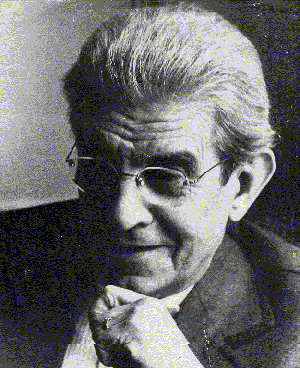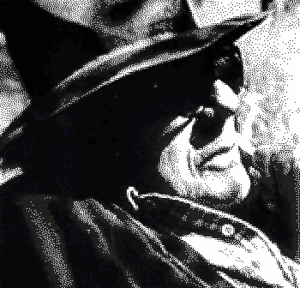May 27, 2006
"The big Other at its purest is legal order"...
 |  |
Typically brilliant report on the Thursday Zizek lecture from Daniel at Different Maps.
Like me, Daniel notes an increasing convergence between Zizek and Deleuze. 'Zizek seems to be moving closer and closer to Deleuze with every day that passes, on the basis of the surely double-edged (for Zizek) syllogism Deleuze = Hegel + Lacan.' As if to prove one of the points Zizek kept making, though, the Deleuze, Hegel and Lacan that return via Zizek are not the same figures they were before; through repetition, difference emerges.
One of the question posed on Thursday, was: why does Deleuze turn away from Lacan and Freud? The quick, somewhat journalistic-biographical answer would be that Deleuze (with Guattari) fell under the spell of a 68 spontaneism, one effect of which was a lose patience with questions to do with metalanguage. If the problem with deconstruction is that it effectively says there is nothing but a metalanguage, the vice of Deleuzianism is its skating over the whole question; forget metalanguage, we are told, we can have direct machinic encounters. What Deleuzianism overlooks - what is has to overlook - is that it is precisely the invocation of an intense, unmediated non-cognitive and non-linguistic experience that introduces an element of transcendence and lack. That is because the philosophical call for an unmediated Real must always repress the Real of the writing and thinking involved in that call itself. (By the by, many of the Deleuzians I've known are exactly the sort of people least able to give themselves over to immediate, noncognized experience - they are those who will be jabbering about philosophy when they are on a drug trip, or taking notes when they are in a nightclub - real examples both). But why deny that writing, thinking and speaking can themselves be sources of jouissance, unless you are in hock to a certain kind of Romanticism? What is lacked in the Lacanian death drive is only the fullness of the desired object or the possibility of the termination of the drive - and who, especially a Deleuzian, would want either of those things?
It seems that Deleuze has a real difficulty thinking what Lacan calls 'the spaltung' (the split). Deleuze can only conceive of the split between the subject of enunciation (that which speaks) and the subject of the statement (that which is spoken about) in dualistic terms. Hence his calling Lacan a Cartesian, an accusation which Zizek has famously turned around. Instead of seeing Lacan as the last Cartesian, Zizek advances the thesis - in Tarrying with the Negative and elsewhere - that Descartes is the first Lacanian.
Deleuze proclaims that the 'only enemy is two'. He understoods perfectly well that a split is involved but is unable to grant any ontological specificity to the concept of the split, and rushes to reduce it to a dualism: 'the source of dualism, it seems to me... is this flattening of all statements of thought, precisely, by this speculative, Oedipal apparatus in which the statement, on the one hand, is related to the subject, to a subject, and on the other hand, and simultaneously, the subject is split into a subject of the statement and the subject of enunciation.' (By contrast with Deleuze, the Irigarayan concept of the 'not one' - with its Imaginary figuration as the lips which are neither one nor two - does grant ontological consistency to the split.) Perhaps we can oppose the Lacanian spaltung to the Deleuzian 'between'; whereas the between takes its place in the interstitial gap between unities, the spaltung breaks unities into less than one (there is no possibility of unification) and more than one (the subject is always doubled, which is not to say dual).
"The big Other at its purest is legal order," Daniel quotes Zizek as saying. There, in nutshell, is the reason for my loathing of lawyers and the postmodern lawyer plague. Law and PR are the twin avatars of the big Other in postmodernity, with the agents of capitalist parliamentarianism (politicians) poised between the two. What both the lawyer and the PR person herald is a new post-veridical mode that is not lying but in which the question of truth and falsity is suspended in favour of illocutionary efficacy. For example: it doesn't matter that every single human subject knows that Bill Clinton 'had sex with that woman' provided the juridical big Other does not hear it said that he did. (In both law and parliamentary politics, a theatrical adversarialism covers over class solidarity. We all know that the Real of the house of commons or a courtroom is to be found in the bar after a debate or a trial, where the staged dispute gives way to conviviality.)
The latest emergence of the obscene underside of this 'politics of nontruth' occurred last week when it was revealed that the Labour Party had auctioned a copy of the Hutton report signed by Cherie Blair. It is the speed of the switch from po-faced piety to officially-sanctioned cynicism that is astonishing here. Already, a lived historical sequence, a sequence that is still in-becoming, has become dead History; the Hutton report is a museum piece, the occasion for an anecdote on an I Heart 2005 retrospective. Remember when we hounded a man to his death, eh? What was in the charts at the time?
Daniel's piece has reminded me of two other questions I would have posed to Zizek on Thursday if I had had the opporunity.
1. Is it a matter of eliminating the big Other altogether or of producing a new big Other? The Tom Ripley of the later novels, with his beautifully-kept house and impeccable taste strikes me as being the avatar of the Glam impulse - his living of the perfect upper middle class life, his living it better than his Betters, ends in the same impasse of empty success that has existentially blighted Bryan Ferry for the last thirty years, and it is clear that Ferry's case was something that punk had to nihilate. If for Ferry, as for Ripley, only the big other exists, what Rotten proclaimed was that there is no big Other, you do not need validation from pre-existing Opinion. But, is it possible to imagine a big Other that is not inherently productive of mediocrity, conservativism and conformity? I think this is the real significance of Nietzsche's call for 'aristocratic values' and his rejection of the 'herd ideal'. Nietzsche wanted a big Other that would challenge us, make demands of us, make us want to be more than what we are. But the current V and A show demonstrates that the call for excellence and novelty need not, as Nietzsche thought, be essentially elitist - Modernism was about libidinizing a Public Good that, according to neo-liberalism, can only be drab, dreary and mediocre. Daniel puts it like this: how do we make ourselves a big Other without organs?
2. (And this is perhaps the same question as 1 but posed slightly differently.) Is there a difference between the big Other and the ego-ideal? It seems to me that iwhat drives us to struggle to be more than we are must be something like the ego-ideal, the virtual audience - our spectral double - whom we seek to be worthy of.
Posted by mark at May 27, 2006 06:06 PM | TrackBack